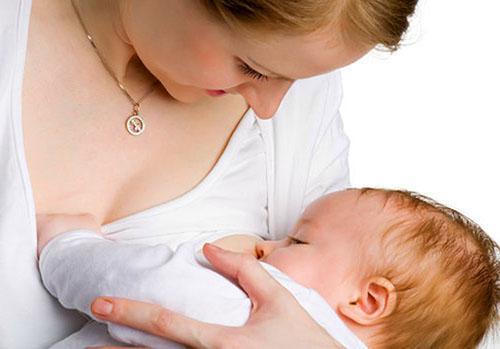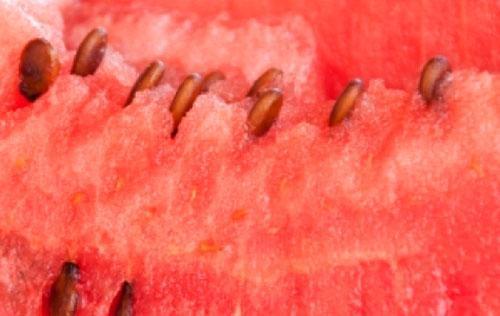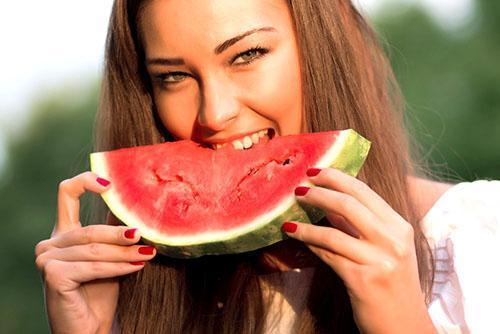Can a nursing mother eat watermelon?
 Most of us, both children and adults, love a delicious, sweet, juicy watermelon that is hard to resist the taste of. Moreover, various varieties of this berry are sold at every turn at the end of summer. Therefore, women who have recently given birth often ask the question, is it possible for a nursing mother to have a watermelon? There are no definite rules about this. Doctors say that you can eat a watermelon that is ripe in season, because the early fruits contain a lot of nitrates.
Most of us, both children and adults, love a delicious, sweet, juicy watermelon that is hard to resist the taste of. Moreover, various varieties of this berry are sold at every turn at the end of summer. Therefore, women who have recently given birth often ask the question, is it possible for a nursing mother to have a watermelon? There are no definite rules about this. Doctors say that you can eat a watermelon that is ripe in season, because the early fruits contain a lot of nitrates.
Benefits of watermelon for breastfeeding

- Antioxidants similar to carotene that improve vision.
- Vitamins B1, B2, C, which have a beneficial effect on the body, regulate the functions of the nervous and cardiovascular systems.
- Iron, which helps to increase low hemoglobin levels during lactation.
- Calcium deficiency causes hair loss, brittle nails and dental problems in nursing mothers.
- Trace elements that slow down aging and the development of cancer.
- Panthenolic acid, which improves intestinal motility, activates metabolic processes, helps to normalize sleep and removes toxins from the body.
- Folic acid, which is prescribed by doctors during pregnancy for expectant mothers. It contributes to the normalization of digestive processes, the production of breast milk, the development of the child's immune and circulatory system, as well as the regeneration of the skin.
Due to the diuretic effect, watermelons help to remove excess salts and toxins from the body.
 In addition, watermelon is low in calories. 100 g of the fruit contains only 25 calories, which is equivalent to birch or carrot juice. Therefore, the use of this product will help nursing mothers get rid of extra pounds. (cm.watermelon peel jam the easiest recipe with a photo step by step)
In addition, watermelon is low in calories. 100 g of the fruit contains only 25 calories, which is equivalent to birch or carrot juice. Therefore, the use of this product will help nursing mothers get rid of extra pounds. (cm.watermelon peel jam the easiest recipe with a photo step by step)
Danger of watermelon during lactation
 However, the use of watermelon during lactation can have some troubles:
However, the use of watermelon during lactation can have some troubles:
- It can cause allergies, although this does not happen with everyone.
- It is not recommended to combine watermelon with other food products, as it can cause increased gas production in mom and baby.
- To speed up the ripening of watermelons, nitrates are very often used, so it is advisable not to take risks buying early varieties. It is best to consume watermelons during the high season, when the likelihood of nitrate poisoning is significantly reduced.
- Poor transportation and storage of watermelon can cause an infection on its rind, which can easily get inside if damaged.
How to choose the right watermelon?
 Doctors say that in the first 2 months after giving birth, you should not use watermelons, and in the future you need to be more careful with them. Poisoning and allergic reactions are possible. This is especially dangerous for children in the first year of life. To prevent this from happening, you need to carefully choose the product, and it is recommended to buy it at the end of August. A young mother needs a ripe watermelon, so you need to check it well.
Doctors say that in the first 2 months after giving birth, you should not use watermelons, and in the future you need to be more careful with them. Poisoning and allergic reactions are possible. This is especially dangerous for children in the first year of life. To prevent this from happening, you need to carefully choose the product, and it is recommended to buy it at the end of August. A young mother needs a ripe watermelon, so you need to check it well.
When purchasing a watermelon (only during mass ripening), you need to pay attention to the following nuances:
- the tail of the watermelon must be dry;
- a yellow-white or yellow spot should be present on the side, which indicates that it has ripened on the ground;
- when squeezing a watermelon, a small characteristic crackle should be emitted, which also indicates its ripeness.
 These parameters indicate the ripeness of the watermelon. However, this does not guarantee the good quality of the purchase. Therefore, it is recommended to conduct a nitrate test on the purchased watermelon. To check, a small piece of pulp is placed in a transparent container with water and its color is observed. If the water becomes cloudy, turns pink, or turns into a liquid resembling milk, then this watermelon must be discarded.
These parameters indicate the ripeness of the watermelon. However, this does not guarantee the good quality of the purchase. Therefore, it is recommended to conduct a nitrate test on the purchased watermelon. To check, a small piece of pulp is placed in a transparent container with water and its color is observed. If the water becomes cloudy, turns pink, or turns into a liquid resembling milk, then this watermelon must be discarded.
It is not recommended to purchase watermelon that is sold near highways, cracked or cut into halves and quarters in stores. The same goes for soft watermelons that don't look good to eat.
How to eat watermelon correctly?
 First of all, the watermelon must be thoroughly washed before use. The quality of the product can first be checked on dad, and if everything is good, then mom can eat too. How to eat watermelon correctly? First you need to eat a small piece and see how it will affect the child. If the baby feels great throughout the day, then you can increase the size of the piece.
First of all, the watermelon must be thoroughly washed before use. The quality of the product can first be checked on dad, and if everything is good, then mom can eat too. How to eat watermelon correctly? First you need to eat a small piece and see how it will affect the child. If the baby feels great throughout the day, then you can increase the size of the piece.
If the baby has a rash, diarrhea or tummy pains, you should stop drinking watermelon. The allergy usually occurs in the form of a rash and quickly disappears if the irritant is eliminated. It can manifest itself for three days, so during this period you need to monitor the child and not include new foods in the diet.
Recommendations!
- It is not recommended to finish eating yesterday's watermelon, even if it was in the refrigerator.
- It is not advisable to introduce 2 new products into the diet at the same time, first you need to deal with one.
- If you want to eat watermelon with bread, you should choose wheat varieties, they are less likely to have stomach upset in the child.
 If you are breastfeeding, then this is not a reason to refuse most foods, especially vegetables and fruits. There are many vitamins in watermelon, so it is recommended to be eaten by both adults and children, both pregnant and lactating. Diversify your diet with vegetables, berries and fruits grown in the country. Eat beets, carrots, apples, raspberries, strawberries, but in small quantities.
If you are breastfeeding, then this is not a reason to refuse most foods, especially vegetables and fruits. There are many vitamins in watermelon, so it is recommended to be eaten by both adults and children, both pregnant and lactating. Diversify your diet with vegetables, berries and fruits grown in the country. Eat beets, carrots, apples, raspberries, strawberries, but in small quantities.
You still have a question, is it possible to eat watermelon while breastfeeding? Of course, you can, it is only important to observe the measure, monitor the reaction of your baby and choose the right watermelon so that it will only benefit.